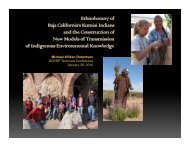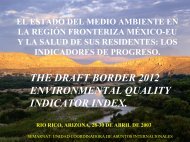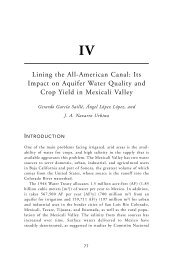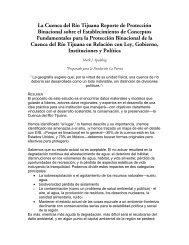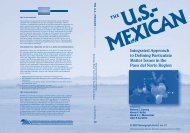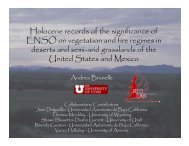Entire Book - Southwest Consortium for Environmental Research ...
Entire Book - Southwest Consortium for Environmental Research ...
Entire Book - Southwest Consortium for Environmental Research ...
Create successful ePaper yourself
Turn your PDF publications into a flip-book with our unique Google optimized e-Paper software.
Manquiladora Attitudes<br />
METHODOLOGY USED IN THE SURVEY<br />
The survey was conducted in the summer of 2002 and consisted of<br />
27 questions—21 objective questions and six subjective, open-ended<br />
questions. The questions were designed to elicit in<strong>for</strong>mation about<br />
respondents’ knowledge of emissions trading, willingness to participate<br />
in emissions trading programs, as well as in<strong>for</strong>mation about the<br />
institutional framework in which emissions trading will take place,<br />
such as the prevalence of environmental committees. It is unusual to<br />
include so many open-ended questions in a questionnaire of this<br />
type; however, it was thought that open-ended questions were necessary<br />
to elicit the in<strong>for</strong>mation desired. A total of 200 maquilas were<br />
surveyed. Ciudad Juárez, having the most maquilas among the three<br />
Mexican border cities surveyed, was allocated a sample size of 80<br />
maquilas. Reynosa and Matamoros were each allocated a sample of<br />
60 maquilas. Local contacts from each city were used to administer<br />
the survey, including Lic. Patricia Vázquez Zarate of the Instituto<br />
Tecnológico de Matamoros, Ing. Esperanza Rosales Gutiérrez of the<br />
Instituto Tecnológico de Reynosa, and Ing. Cesar Nuñez of the<br />
Departamento de Ecologia del Estado (Chihuahua) in Ciudad<br />
Juárez. Each of these individuals consulted with at least one of the<br />
authors and supervised the students who conducted the survey.<br />
In Reynosa and Matamoros, surveys were sent to all maquiladoras.<br />
After a few weeks, students followed up by making calls to individual<br />
plants. This process was continued until all 60 surveys were<br />
collected. In Ciudad Juárez, all maquiladoras registered with the<br />
state’s environmental agency were contacted. The same procedure of<br />
follow-up calls was per<strong>for</strong>med until the 80 surveys were collected.<br />
The individual students were handed a random list of maquiladoras<br />
to contact, thus attempting to eliminate any bias in terms of which<br />
were contacted by phone. The instrument itself was written in<br />
Spanish. A copy of the instrument is included as an appendix to this<br />
chapter.<br />
79




